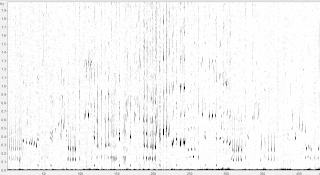It's been a non-stop whirlwind for the past 11 days. The station is set up, we are trying to find people with boats willing to take us out to look for whales, and in the background, a couple interns are busily trying to find whales in the midst of hundreds of thousands of sound clips.
Yupp, I said hundreds of thousands.
So young padawans, I am going to (try to) explain to you the intricacies of acoustic analysis.
Hydrophones are underwater microphones attached to recorders that are suspended in the ocean by buoys. They record noise at intervals for a specific amount of time, then are brought back to the surface. The recorded clips are downloaded onto a computer, and then analyzed by people with absolutely no time on their hands (which is why they ply interns with free accommodations and a tropical setting).
The clips, in some kind of sound file format, can be analyzed in a variety of ways. One way would be to simply listen to them. All of them. Now can anyone tell me the problem with this?
Let's do a math question: a hydrophone records for a 20 second interval every five minutes for 5-8 months. What would be the length of sound you would have to listen in order to analyze every file created?
I don't even want to do the math. Bonus points for whoever does (and comments below).
So obviously that is a bigger waste of everyone's time than watching grass grow or paint dry. Plus everyone's range of hearing is different, so who knows what one person might miss?
The solution to this is to look at the sound files and find whales.
Wait... what? What dimension are you living in? Seeing sound files?
Calm down! Let me explain...
Spectrograms are a type of image that let's you see sounds over their frequency range over an amout of time. It's a graph, x by y, but each point is so minute and there are so many that it becomes an image. An image of an empty underwater spectrogram might look like this...
 |
| Sample found here |
BUT
When something biological makes sound, it shows up crisp and clear against all the background noise. Here is an example of a humpback whale spectrogram.
 |
| Can you see the whale? Can you? |
Look at the empty spectrogram. Now at the whale one. Now back at the empty one. The empty one is not the whale one, but with patience and time, it could be.
So using programs like Ishamel, RavenPro, or SASlab, you can create these spectrograms and look for whales, fish, dolphins, whatever you need. Even things like rain, thunder, boats and jet skis show up distinctly on spectrograms. And once you know what your looking for, it's pretty easy and fast to get through the ones that don't have anything on them.
For us, once we find whale or fish or anthropogenic noise on a clip, we mark it in a spreadsheet so our supervisor can do what she needs to do.
That's it. Some people's eyes start to get really tired after a couple hours, but for some reason I can do about 8 hours worth of files without my eyes going buggy. I suppose that to be a good thing because I want to study acoustics for the rest of my life (or at least my next degree).
A really funny side effect: You start being able to look at the shape of the marks on the spectrograms and be able to make the sounds of the animal. So based solely on the whale shaped marks, I am learning to sing whale. But I will ever be as good as Dory.
That's it! It's essentially what I've been doing since I got here, other than general cleanup and maintenance of the station (AKA house).
One last thing... I love that my family and friends are reading and following this blog, believe me, the support is amazing and occasionally brings me to tears (kidding... sort of). BUT if anyone out in cyberspace is reading this and doesn't actually know who I am, I would love to hear from you in the comment section! The point is to inspire and educate, and I don't know if any of my friends or family are secretly aspiring marine biologists. That's it, just giving everyone a shout out.
Speak Loud!
Thousands of aspiring marine biologists will be devouring your every word when you publish this. Unbiased admirer.
ReplyDelete